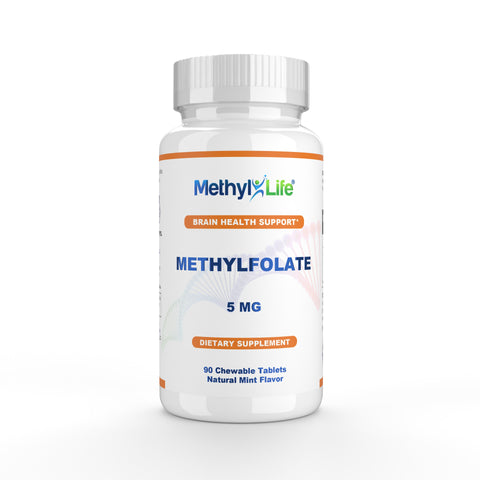
Methylfolate & Insomnia
Product Recommendations
Methylfolate 5 mg
$44.00
- Bioactive 5 Methylfolate That Crosses Blood-Brain Barrier 3
- Supports Cardiovascular Function 5 & Brain Health 4
- 3rd-Party Tested for Purity, Potency & Safety
- 90 Vegan, Non-GMO, Chewable Mint Tablets

Written By:
Katie Stone - Naturopath
Medical Reviewer:
Dr. Conor Sheehy - PharmD, BCPS
Edited By:
Kari Asadorian - BSN, RNUpdated On:
March 25, 2025There are many ways that folate may impact sleep patterns, including:
- Circadian rhythm
Folate deficiency was found to result in weakened internal clocks and poor light responsiveness, which also occurs with aging. This suggests that poor folate status in elderly people might be a contributing factor to age-related sleep and circadian disorders, and that maintaining adequate folate levels could potentially help maintain healthy sleep-wake cycles as we get older. Researchers suggest that folate supplementation may improve sleep duration and quality.2
- Neurotransmitter synthesis
Folate helps regenerate methionine from homocysteine, which is a precursor for S-adenosylmethionine (SAM-e). SAM-e is a methyl donor required for neurotransmitter synthesis, including serotonin. Folate deficiency can lead to lower SAMe levels, potentially affecting the production and activity of serotonin and melatonin.3
Folate is also required for the synthesis of 5-hydroxytryptophan (5-HTP), a precursor of serotonin. Serotonin, in turn, is a precursor to melatonin. Serotonin is converted to melatonin, the primary sleep hormone.
- Homocysteine regulation
Folate is essential for maintaining healthy homocysteine levels by assisting with the conversion of homocysteine to methionine. Folate deficiency can lead to elevated homocysteine, which has been linked to sleep disturbances and neurological problems. A recent study found that short sleep duration was associated with higher serum homocysteine levels in women.4
- GABA regulation
GABA is a neurotransmitter that helps to ‘calm’ the mind and body, which makes it helpful with inducing sleep and relaxation. Some research has suggested that folate deficiency may affect GABA function. When folate is deficient, homocysteine levels rise and compete with GABA for binding to GABA receptors.5 This means that GABA can’t function effectively because homocysteine is "blocking" the receptors. However, folate supplementation was found to increase GABRB1 receptor expression, which could potentially compensate for any competitive inhibition by homocysteine and restore normal inhibitory signaling.6
How does methylfolate affect sleep?
L-methylfolate is the active bioidentical form of folate. It plays a vital role in the production of neurotransmitters involved in healthy sleep, particularly dopamine, serotonin, and norepinephrine. The MTHFR variant, which affects methylfolate production, is known to affect monoamine synthesis.
A 2024 study involving patients with MTHFR (both C677T and/or A1298C) and sleep problems examined the effects of 5mg methylfolate supplementation over eight weeks.
The patients’ sleep improved significantly after just two weeks, and by eight weeks, all patients reported better sleep patterns. The researchers concluded that L-methylfolate supplementation may help people with MTHFR variants sleep better.7
A genome-wide association study revealed that MTHFR is associated with several sleep issues, including sleep duration, insomnia symptoms, and sleep latency.8
A 2022 case study found that a patient with chronic insomnia, fragmented sleep, and short sleep duration had a homozygous MTHFR C677T variant, as well as mildly elevated homocysteine levels. She had failed to respond to multiple sedative-hypnotic medications, supplements, and cognitive behavioral therapy for insomnia, the current ‘gold standard’ for insomnia treatment.
The patient was supplemented with folate and vitamin B12 to compensate for reduced MTHFR enzymatic activity, along with melatonin. However, after her folate and B12 levels were restored, she was able to successfully discontinue the melatonin without any adverse effects on her sleep. The researchers stated that this was the first case of chronic insomnia being successfully diagnosed and treated by targeting a MTHFR variant associated with sleep disruption.9
Best time of day to take methylfolate
The best time to take methylfolate depends on your own routine. Everyone is different, and some people may find that they prefer to take methylfolate in the morning, others at midday and some may even prefer evening. Clinicians find that in general, many prefer to take methylfolate in the morning or early afternoon as it can be too energizing for some and keep them awake at night. The most important thing is to take it every day, preferably at the same time each day.
Nutrients needed for a good night's sleep
Studies suggest that the most important nutrients for healthy sleep patterns include magnesium, vitamin B12, melatonin, methylfolate, and 5-HTP. Herbs such as ashwagandha, St John’s wort, chamomile and valerian may also help.
Methylfolate & Insomnia
Key takeaways:
-
 Low folate levels are linked to shorter sleep duration and sleep disturbances.
Low folate levels are linked to shorter sleep duration and sleep disturbances.
-
 Methylfolate supports production of neurotransmitters essential for sleep.
Methylfolate supports production of neurotransmitters essential for sleep.
-
 People with MTHFR gene variants may benefit from methylfolate supplementation for better sleep.
People with MTHFR gene variants may benefit from methylfolate supplementation for better sleep.

Product Recommendations
5 Methylfolate: 5-mthf L-Methylfolate 5 mg
$44.00
- Bioactive 5 Methylfolate That Crosses Blood-Brain Barrier 3
- Supports Cardiovascular Function 5 & Brain Health 4
- 3rd-Party Tested for Purity, Potency & Safety
- 90 Vegan, Non-GMO, Chewable Mint Tablets
Frequently Asked Questions about methylfolate and insomnia
Research shows that higher folate levels are associated with longer sleep duration, and that folate deficiency can lead to sleeplessness and insomnia. Folate supports sleep by helping produce key neurotransmitters like serotonin and melatonin, and by regulating homocysteine levels (elevated homocysteine is linked to sleep disturbances). Studies specifically found that methylfolate supplementation significantly improved sleep in patients with MTHFR genetic variants within just two weeks, with continued improvements over eight weeks.
Although folic acid plays a role in the production of neurotransmitters that support healthy sleep patterns, it is unlikely to make you feel sleepy.
The time you take folate depends on what works best for you. Many take it in the morning or earlier in the day due to its energizing effects for some. It is more important that you take your folate every day, preferably at the same time each day.
Research suggests that yes, methylfolate may help people with sleep disorders, especially if they have MTHFR variants and/or low folate levels. L-methylfolate can help increase neurotransmitters responsible for sleep quality.
While too little folate in the body has been linked to insomnia, there is limited research regarding excess folate and insomnia. However, folate can be energizing for some, which might affect sleep if taken before bed. It is important to take folate supplements according to dosage instructions, and consult your healthcare practitioner if you have trouble sleeping.
References
-
Yandong Dong, Mei Luo; "Association between serum folate and sleep duration in American adults: A cross-sectional analysis of the National Health and Nutrition Examination Survey 2005 to 2010"; Medicine (Baltimore); 2024 Nov
https://pmc.ncbi.nlm.nih.gov/articles/PMC11608681/
-
Etienne Challet, Stéphanie Dumont, Madah K M Mehdi, Caroline Allemann, Tiffanie Bousser, Sylviane Gourmelen, Dominique Sage-Ciocca, David Hicks, Paul Pévet, Bruno Claustrat; "Aging-like circadian disturbances in folate-deficient mice"; "Neurobiology of aging"; 2013 Jun
https://pubmed.ncbi.nlm.nih.gov/23273571/
-
Haoyu An, Qiyun Xue, Jingyi Zhang; "The association between serum total folic acid concentration and severe difficulty falling asleep in US adults: NHANES 2005–2008"; Frontiers in neurology; 2023 Sep
https://pmc.ncbi.nlm.nih.gov/articles/PMC10551128/
-
Tien-Yu Chen, John W Winkelman, Wei-Chung Mao, Chin-Bin Yeh, San-Yuan Huang, Tung-Wei Kao, Cheryl CH Yang, Terry BJ Kuo, Wei-Liang Chen; "Short Sleep Duration Is Associated With Increased Serum Homocysteine: Insights From a National Survey"; Journal of clinical sleep medicine; 2019 Jan
https://pmc.ncbi.nlm.nih.gov/articles/PMC6329535/
-
Bhargava, S., Tyagi, S.C.; "Nutriepigenetic regulation by folate–homocysteine–methionine axis: a review."; Mol Cell Biochem; 2013 Nov
https://link.springer.com/article/10.1007/s11010-013-1869-2
-
Bhargava, S., Tyagi, S.C.; "Nutriepigenetic regulation by folate–homocysteine–methionine axis: a review."; Mol Cell Biochem; 2013 Nov
https://link.springer.com/article/10.1007/s11010-013-1869-2
-
Alex S Carmon, Russell J Amato, Seema M Patel, Shannon W Finks; "Effect of L-Methylfolate Supplementation on Sleep for Patients with Reduced Methylenetetrahydrofolate Reductase Activity";
https://pubmed.ncbi.nlm.nih.gov/38528721/
-
Daniela Bragantini, Børge Sivertsen, Philip Gehrman, Stian Lydersen, Ismail Cüneyt Güzey; "Genetic polymorphisms associated with sleep-related phenotypes; relationships with individual nocturnal symptoms of insomnia in the HUNT study"; BMC medical genetics; 2019 Nov
https://pubmed.ncbi.nlm.nih.gov/31718593/
-
Vidhi Kapoor, Nathaniel F Watson, Lonnele Ball; "Chronic insomnia in the setting of MTHFR polymorphism"; Journal of clinical sleep medicine; 2022 Apr
https://pmc.ncbi.nlm.nih.gov/articles/PMC8974368/

About the Author
Katie is a qualified Naturopath (BNatMed) and freelance writer from New Zealand. She specializes in all things health and wellness, particularly dietary supplements and nutrition. Katie is also a dedicated runner and has completed more half-marathons than she can count!
Related Articles

Like what you read?
Please subscribe to get more content like this sent to your inbox.
Share This Article
Trusted by Experts. Backed by Science.
Trusted professionals crafting original content backed by verified research. Since 2012, Methyl-Life® has been dedicated to providing evidence-based education to help individuals better understand methylation and nutritional wellness.
-

Expert-authored education
Every article and guide is written or reviewed by professionals specializing in methylation science and nutritional biochemistry.
-

Research-verified information
Our content references peer-reviewed studies and verified data, ensuring accuracy, integrity, and real-world relevance.
-

Educational leadership since 2012
A founder-led team collaborating with clinicians, researchers, and health writers to make complex science accessible and actionable.
-

Transparent and trustworthy
All educational materials undergo internal review for scientific accuracy, compliance, and clarity before publication.
Blog Categories
Table of Contents
Product Recommendations
5 Methylfolate: 5-mthf L-Methylfolate 5 mg
$44.00







